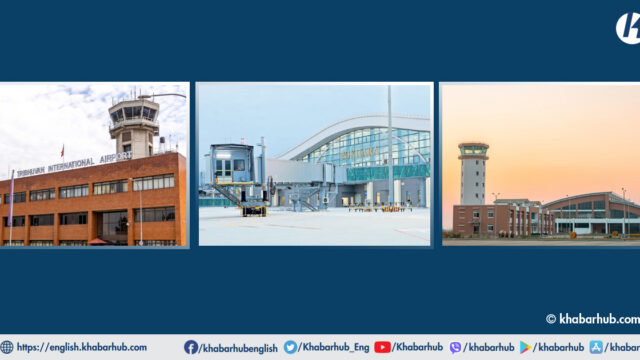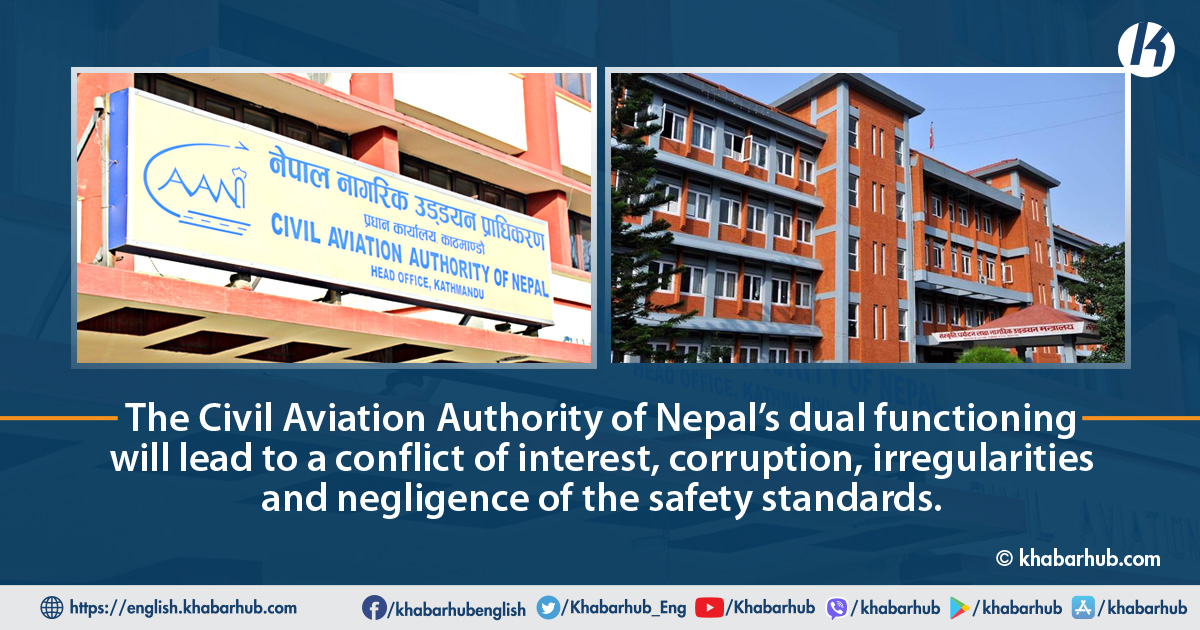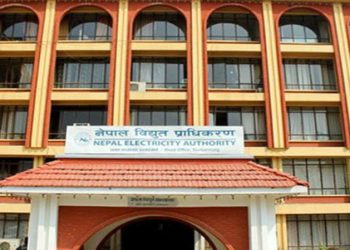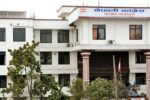Nepal recently faced one of the worst-ever aviation disasters since 1992. A Yeti Airlines ATR 72-500 aircraft crashed in Pokhara on January 15, 2023, raising concern over the global issue of air safety in the Nepali sky.
Nepal government announced a public holiday on January 16 to mourn the death of 72 people, including 68 passengers and 4 crew members.
The government formed a probe committee to study and submit a report within 45 days soon after the tragic incident something which has been billed as a stunt on the part of the government.
The formation of the investigation committee has been billed as a “temporary action” for public consumption and to show the international community to show its commitment to aviation safety. Unfortunately, the problem lies within the government body – the Civil Aviation Authority of Nepal (CAAN) itself.
In fact, the culprit of such a disaster is no other than CAAN, Nepal’s civil aviation regulator body. CAAN has been alleged of being a “silent killer” not only in the aviation sector but also in the country’s tourism economy.
Nepal’s aviation sector is neither safe nor reliable. There is a conflict of interest evident within the CAAN since it has been working as both the regulator and service provider ever since its establishment.
The question is: How can a regulatory body be included as a profit-based service is one of the major causes of aviation safety problems in Nepali sky?
Therefore, CAAN’s restructuring is requisite to implement proper aviation rules and protocols to avoid such tragic accidents in the future.
Nepal has been receiving Asian Development Bank (ADB) grants for the civil aviation sector, which is aimed at strengthening CAAN’s oversight functions, management accountability, and operational efficiency.
Since 2009, the International Civil Aviation Organization (ICAO) has been suggesting Nepal split CAAN into two separate entities.
The ICAO lifted the ban on Nepali airlines in 2017 following Nepal’s commitment to function aviation sector without any conflict of interest.
Former Tourism Minister Jeevan Ram Shrestha insisted to forward the bills during his initial term, but later he changed his tone and made good ties with Adhikari. Shrestha himself started lobbying against the bills with Prime Minister after he fulfilled his vested interests from CAAN.
Since 2013, the European Union has blacklisted Nepal’s aviation sector banning Nepali aircraft from operating in European skies because of aviation safety concerns.
It may be noted that the split of CAAN into two entities is Nepal’s own commitment since 2009 but it has not been operationalized yet.

In order to ensure safety aviation rules, Nepal needs to have one service provider and another regulating body.
But Nepal has been alleged of deceiving the international community and trying to give the impression that they have formed a committee to prepare a new draft for the process, which still is in limbo since several corrupt government and CAAN officials are found to be playing foul for their personal benefits.
Nepal’s Government has spent more than 12 years on aviation bills and spent millions of dollars in the period.
Nepal paid over US$ 4.3 million to Spanish Consultancy Company Inco. But has not yet implemented the draft act and made new-committee members.
On August 2, 2021, the National Assembly (Upper House) of Nepal’s Federal Parliament, passed the Air Service Authority of Nepal (ASAN) Bill and the Civil Aviation Authority of Nepal (CAAN) Bill.
It took nearly six years of efforts to endorse the bills, including the draft of the legislation, foreign assistance and support to replace the existing aviation laws.
As per the law, a bill needs to be endorsed by the House of Representatives (Lower House) and get authenticated by the President for the implementation of the bill.
Therefore, only after the endorsement of the House of Representatives and the presidential stamp, the process to split the Civil Aviation Authority of Nepal (CAAN) into two separate autonomous entities, as an aviation sector regulator and as a service provider, will begin.
Irregularities at the CAAN had multiplied during the tenure of the then Minister for Culture, Tourism, and Civil Aviation Prem Bahadur Ale.
Irregularities in Nepal’s aviation sectors have multiplied after the then Minister Ale appointed Pradeep Adhikari as the Director General of the Civil Aviation Authority of Nepal.
Adhikari’s deep-rooted connection, arrogance and inconsistent decisions over Nepal’s aviation have put the whole sector including Nepal’s tourism in disarray.
If the insiders are to be believed, CAAN authorities are more inclined to power centers by bribing them, constructing airports in home districts of powerful political leaders, top bureaucrats, the leadership of constitutional bodies and anti-corruption agencies by squandering millions of taxpayers’ money.
The functioning of CAAN has been made ineffective following the appointment of Adhikari, who engaged in appeasing the ministers, powerful leaders, anti-graft chief, and bureaucrats rather than uplifting the organization.
Interestingly, both the then Minister Ale and Adhikari made good ties with the then Prime Minister’s family to ensure that the bills were left in limbo. They are also involved in lobbying against the bill for their personal benefit.
Former Tourism Minister Jeevan Ram Shrestha insisted to forward the bills during his initial term, but later he changed his tone and made good ties with Adhikari. Shrestha himself started lobbying against the bills with Prime Minister after he fulfilled his vested interests from CAAN.
Adhikari also succeeded in influencing former Prime Minister Sher Bahadur Deuba’s family to not forward the bill from the cabinet to the Parliament.
In fact, he himself is a hindrance when it comes to implementing the international standard safety for reformation in CAAN.
Moreover, he also has a track record of his involvement in getting Chinese loans to build airports, and experts view that the international community needs to pay close attention to this.
CAAN has over 1,200 employees but less than 10% are capable on the operational side. Most of the employees are engaged in five employee unions affiliated with different political parties. Interestingly, their job is to engage more in corruption and play the political game inside the organization.
Taking advantage of the unions, CAAN management has been using them as a tool to obstruct any reforms within the body, which means that these unions, too, have a hand to weaken the regulatory body.
Adhikari, who is adept in fixing things to this favor has used the unions to continue lobbying with all the state mechanisms, particularly with the top political leaders with the suggestion of implementing a Singaporean model mechanism of Civil Aviation Authority.
However, he is equally knowledgeable that the corrupt mentality and practice in Nepal cannot be compared with the Singaporean practice. This means that the CAAN officials will not take any concrete aviation safety measures but continue to shed crocodile tears as a ploy to mend their mistakes.
It may not be wrong to say that CAAN has been a “white elephant” for the general public for the consistent losses incurred but a “cash cow” for Nepalese power elites since this government body lacks institutional and managerial efficiency.
On the other hand, all flights at Nepal’s second international airport Bhairahawa’s Gautam Buddha International Airport have been suspended since December 21 due to the unavailability of airplanes.
If the insiders are to be believed, CAAN authorities are more inclined to power centers by bribing them, constructing airports in home districts of powerful political leaders, top bureaucrats, the leadership of constitutional bodies and anti-corruption agencies by squandering millions of taxpayers’ money.
All these are evidence that the CAAN leadership is burdening Nepal with debt by constructing unnecessary airports without proper feasibility and studying the flow of passengers.
Furthermore, the attraction of international airlines in Nepal is not possible due to the syndication of a handful of middlemen who have close ties with CAAN.
In order to fulfill their vested interests, political leaders and CAAN officials have constructed several airports in the districts where passengers are almost nil. Most of Nepal’s airports also lack the necessary facilities and resources but CAAN has been operating domestic flights without proper safety measures.
Adhikari, the Director General of CAAN is messing up the regulatory government body. His arrogance and wrong decision have been impacting the aviation and Nepal’s tourism business, insiders say.
It has been learned that Adhikari threatened a media owner after “negative” news was published about CAAN. Since the media house has also an aviation business, Adhikari threatened to break into the office located near the airport.
It may be recalled that several Nepal’s media earlier reported that Adhikari asked a Buddha Air captain to be grounded for not greeting him with a “Namaskar” at the domestic terminal in June 2022.
All these facts substantiate the claims that the anti-graft commission’s leadership in Nepal takes orders from those who appointed them, protects their family business, and supports their friends and classmates.
Nepal’s aviation sector is slowly becoming a burden to the country’s economy as CAAN top officials are involved in obstructing policy reforms in the aviation sector.
Lack of proper airport research, planning, management, and operation but running uneconomic projects, and constructing ghost airports have hit hard both the CAAN and the aviation sector.
Despite the fact that the media has been frequently raising the issue asking why only 19 out of 55 airports were operational in Nepal, CAAN has remained silent.
Pokhara’s new international airport was built with a soft loan of $215.96m from China’s Export-Import Bank in March 2016.
Meanwhile, on the very first day of its inauguration, China made a controversial remark about that Airport saying that it was a part of China’s Belt and Road Initiative (BRI).
Nepal’s Government needs to fix the problems by taking concrete action in the aviation sector to ensure aviation safety to business feasibility of any costly infrastructure projects.
What has to be understood is that China was just a lender and that was a loan, which Nepal has to pay back. But China’s claim triggered international concern and geopolitical vulnerabilities.
CAAN officials, too, did not release any statement about it since Adhikari was deeply involved in the costly project.
On the other hand, all flights at Nepal’s second international airport Bhairahawa’s Gautam Buddha International Airport have been suspended since December 21 due to the unavailability of airplanes.
No airlines have shown interest in the $70 million cost airport which was inaugurated with much fanfare on May 16.
Nepal also did not make any deal with the Indian government for direct air routes for GBI Airport to the overcrowded Simara air corridor.
Currently, the air faces expensive detours from the same Simara air corridor making it difficult to get an Indian air permit due to the Indian strategic air force base near the area.
Since the Civil Aviation Authority Nepal has protected controversial businessmen and middlemen at the Tribhuvan International Airport (TIA), the country’s first international airport, too, is in the grip of controversial businessmen that make frequent passengers accidents at the arrival terminal.
There are reports of accidents and injuries the passengers every single day at the arrival section of TIA due to wrong engineering. CAAN does not pay attention to fixing the problems.
Almost 7 acres of airport land has been leased out to a private group for 30 years to construct a complex, parking lot at the arrival side of the TIA. The private business group earns a lot of money every day but has not paid its dues to CAAN. Nepal’s Auditor-General’s internal report has pointed out a fault in the new construction.
Ironically, some well-known gold smugglers and dollar smugglers operate shops inside the TIA by bribing CAAN officials.
Irregularities are very normal at TIA, which poses a greater security risk as well as losing state revenue. Such irregularities at the airport had been multiplied during the tenure of Prem Bahadur Ale as the Minister for Culture, Tourism, and Civil Aviation.
The Civil Aviation Authority of Nepal’s dual functioning will lead to a conflict of interest, corruption, irregularities and negligence of the safety standards.
Even though the private business group has controlled the arrival terminal, parking lot, and business complex for profit motives, it has not abided by the agreement clauses and has not even paid the dues.
As per the contract, they need to build a garden, a tourism park, and other facilities, which has not happened yet. The construction activities were started without taking permission for ‘building construction’ from the Kathmandu Metropolitan City. They only registered it after completing the construction of buildings.
These are a couple of examples how Nepal’s civil aviation regulator is up to. CAAN leadership itself is wreaking havoc on aviation, tourism as well as the economic sector.
Nepal’s Government needs to fix the problems by taking concrete action in the aviation sector to ensure aviation safety to business feasibility of any costly infrastructure projects.
The Civil Aviation Authority of Nepal’s dual functioning will lead to a conflict of interest, corruption, irregularities and negligence of the safety standards.
The government, too, needs to initiate concrete steps by taking forward the bills and getting them endorsed by the House of Representatives to break up the dysfunctional civil aviation body into an effective regulator and service provider.









Comment